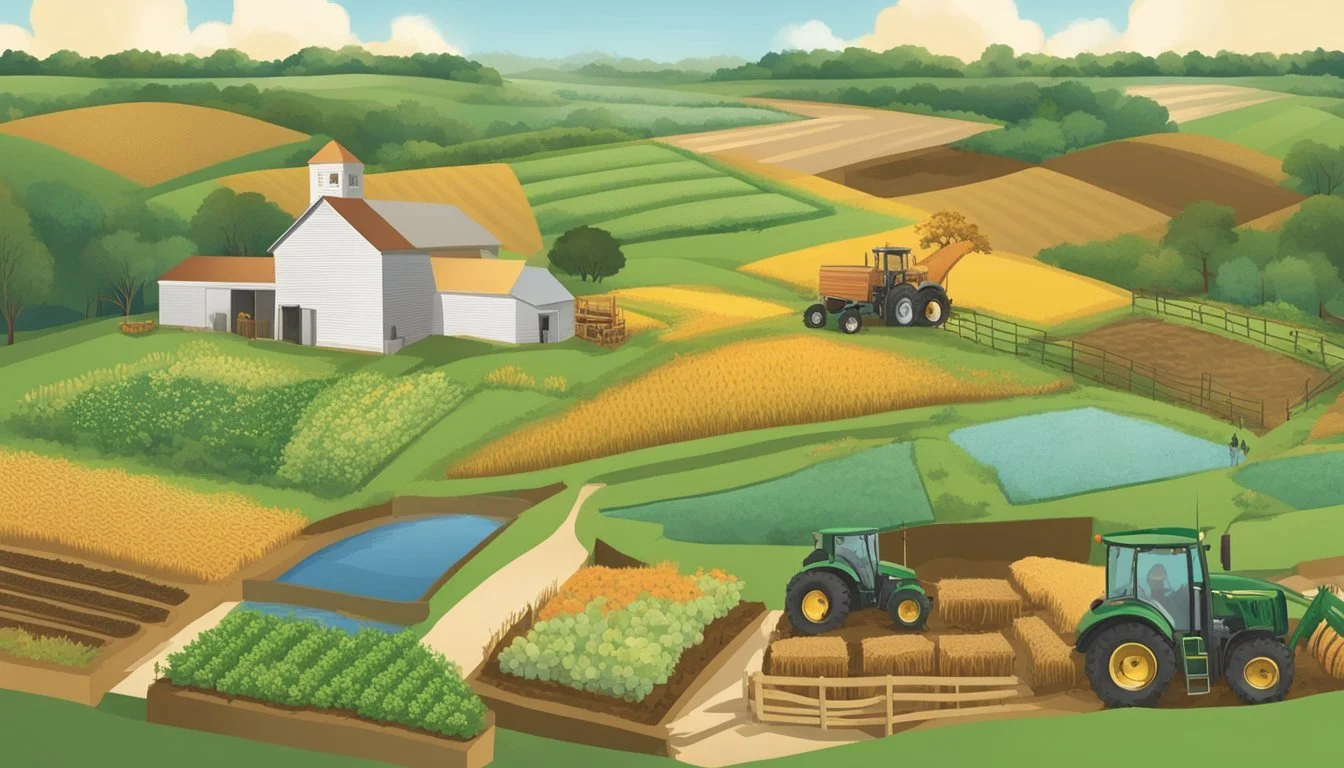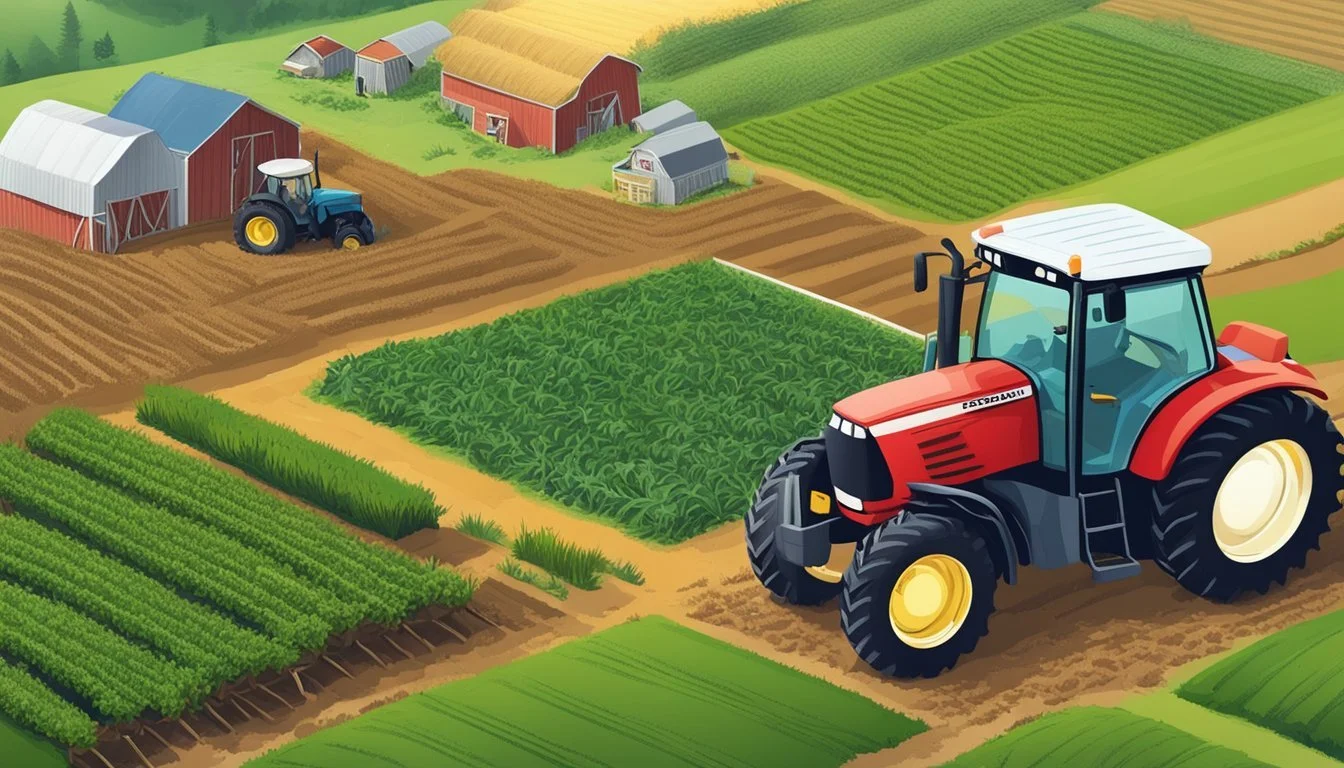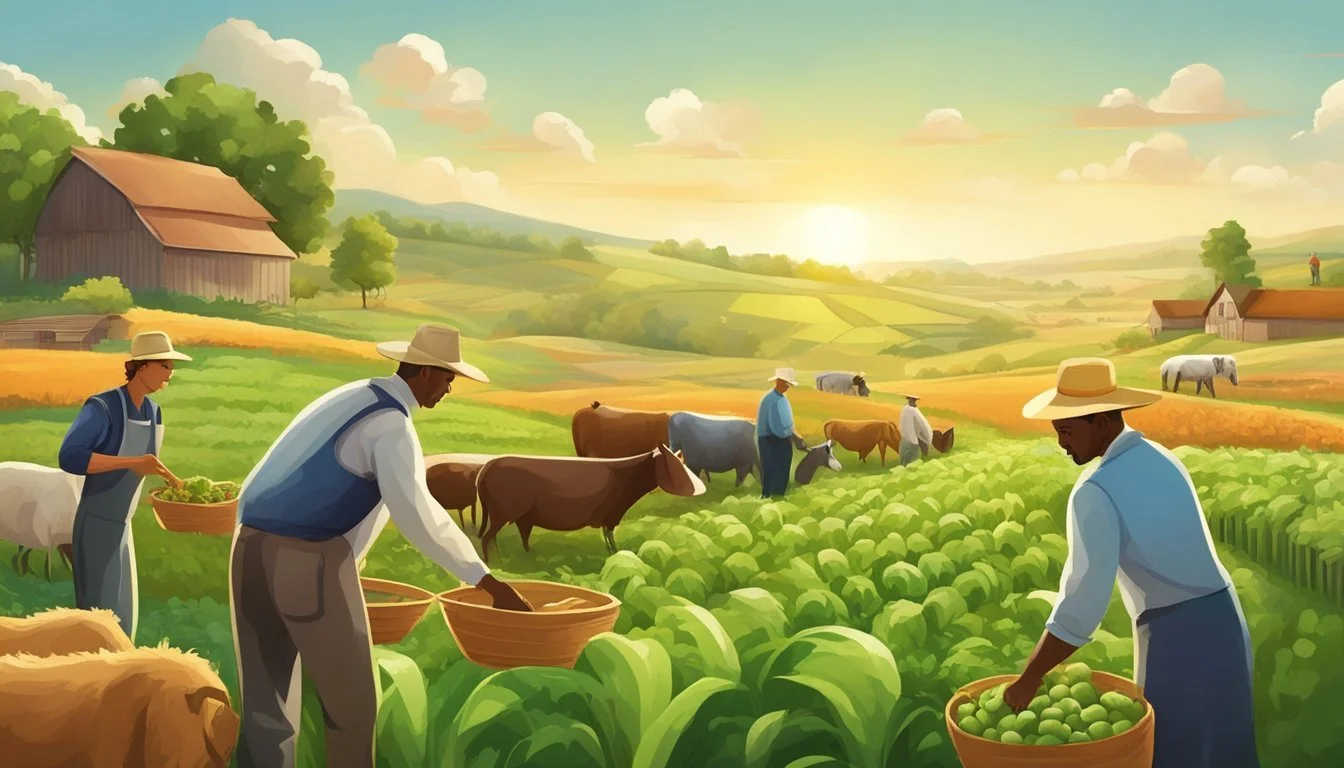Right to Farm Law in Louisiana
Understanding Its Impact and Provisions
Louisiana's Right to Farm Law serves as a safeguard for the agriculture industry, shielding farmers from nuisance lawsuits that could arise from individuals who move to rural areas and then object to the operations of existing farms. Enacted in 1983 and embedded within the state's legislation, the law acknowledges the significance of agriculture both to Louisiana's economy and the basic sustenance of life. It declares that agricultural operations following generally accepted and traditional farm practices merit protection from legal challenges brought forth by new neighbors who may find the routine activities of farm life disruptive.
Despite the protections the Right to Farm Law provides, Louisiana has seen a decline in both the number of farms and the acreage used for farming since the law's inception. This juxtaposition highlights the challenges that the agricultural sector faces, even with legal protections in place. A reduction in farm operations and available farmland has implications for local food production, the preservation of rural landscapes, and the well-being of the state's economy.
The law aims to strike a balance between the rights of farmers to conduct their businesses and the interests of the public who reside in or move to the countryside. By setting the legal framework that favors established agricultural practices, Louisiana's right-to-farm statutes present a clear stance on the priority of farming activities in the state’s rural areas. This legislation not only underpins the importance of agricultural continuity but also seeks to safeguard the heritage of Louisiana’s agrarian landscape.
Historical Context and Development of Right to Farm Laws
This section explores the inception, progression, and particular details of Right to Farm laws, focusing on their trajectory in Louisiana and key legislative changes that have shaped their current form.
Origins and Evolution
Right to Farm laws were instituted in response to the shifting landscape of rural America, primarily as a result of urban sprawl in the 1970s. With more people moving to previously agricultural areas, conflicts arose between new residents and existing farming operations. The main intent of these laws was to protect agricultural operations from nuisance lawsuits, preserving the ability to farm without undue pressure from non-farming neighbors.
Louisiana Right to Farm Law Overview
In Louisiana, the Right to Farm Law was enacted in 1983. It was designed as a defense mechanism for the agriculture industry, safeguarding the value of agricultural land and operations within the state. Louisiana's Right to Farm Law stipulates legislative findings and asserts its purpose to support and maintain agricultural activities and facilities that might otherwise be threatened by nuisance claims.
Major Amendments and Updates
Since its inception in 1983, Louisiana's Right to Farm Law has undergone several amendments. The most notable changes occurred in alignment with the evolution of legislative and societal attitudes towards agriculture and urban development. The updates aimed to continue the support of farming practices while considering environmental and community impacts. Despite these changes, the number of farm operations and the acreage farmed in the state has decreased, as indicated by statistics showing a 23 percent drop in operations and a 20 percent reduction in farmed acres.
Key Provisions in Louisiana Right to Farm Law
Louisiana's Right to Farm Law consists of specific provisions designed to support and protect agricultural activities in the state. These encompass the definition and scope of agricultural operations, the framework for addressing nuisance lawsuits, and the role of governmental bodies in relation to farming activities.
Definition of Agricultural Operations
Agricultural operations, as defined by Louisiana law, are the activities that fall within the realm of farming, including the cultivation of soil, planting of crops, growing of food, rearing of livestock, or any operational practices directly related to agriculture. It is essential to understand these definitions as codified in R.S. 3:3603 to grasp the law's application fully.
Established Date of Operation
The date when an agricultural operation was established is crucial since the Right to Farm Law accords certain protections to farm operations retrospectively. This date can influence the operation's protection under the law specially concerning instances of "coming to the nuisance."
Nuisance Lawsuits Protection
The law provides protection to agricultural operations against nuisance lawsuits, potentially arising from normal farming activities. Specifically, R.S. 3:3603 states that once an agricultural activity is established, it should be protected from such legal actions that deem these practices a nuisance, given they are consistent with generally accepted agricultural practices.
Governmental Entities and Regulation
While the Right to Farm Law supports agricultural practices, operations are still subject to regulation by governmental entities. This includes adherence to state and local laws, including environmental regulations in R.S. 33:361 and R.S. 40:14, ensuring a balance between farming activities and community health and safety standards.
Scope and Limitations
The Right to Farm Law in Louisiana provides support and protection for agricultural activities, setting boundaries on regulations and recognizing the balance needed between farming operations and local interests.
Protected Activities
Agricultural operations in Louisiana are safeguarded under the Right to Farm Law as long as they adhere to generally accepted or traditional farm practices. These practices cover a range of activities essential to farming and livestock operations. Whether crop cultivation or animal husbandry, as long as activities fall within established norms of agriculture, they stand protected.
Limitations and Restrictions
While agricultural activities benefit from protection, there are limitations. Operations must not be negligent and must conform to generally accepted agricultural standards to qualify for protection under the law. The protection does not cover activities determined to be a private nuisance or public nuisance if they are caused by negligent or improper practice.
Interaction with Local Ordinances
The legislation specifically states that agricultural operations established outside municipal confines and later enveloped by urban expansion are not subject to local zoning and nuisance ordinances. Thus, the law prevails over any conflicting local governance, provided the farming operations have not been negligent and comply with recognized agricultural standards.
Legal Implications and Protections
As the agricultural sector faces challenges, the Right-to-Farm Law in Louisiana is designed to offer legal protections to farmers. It's essential to understand the specific implications and shields within the law that secure agricultural operations against certain types of legal challenges.
Civil Code Article 669
Under Louisiana Civil Code Article 669, it is established that a property owner cannot engage in activity classified as a nuisance by causing damage to their neighbors. In the context of agriculture, this statute is nuanced by right-to-farm laws that recognize farming practices as potentially exempt from nuisance suits if they adhere to generally accepted agricultural practices.
Presumption Against Nuisance Actions
The right-to-farm laws create a presumption against private and public nuisance suits. This presumption means that agricultural operations are typically presumed to not constitute a nuisance if they are established prior to surrounding non-agricultural developments, and if the farmers follow generally accepted practices. This legislative shield makes it less likely for newer residents or developers to successfully sue farmers for standard farming operations.
Defending Against Frivolous Lawsuits
Right-to-farm laws in Louisiana also offer protection against frivolous lawsuits. Farmers can use these legal shields as a defense, potentially saving on costly court fees and avoiding unwarranted disruptions to their operations. Additionally, if a lawsuit is proven to be spurious, the farmer may be entitled to attorneys' fees, further discouraging groundless legal actions.
The law's implications are precise in providing these critical defenses, ensuring that agriculture can continue to thrive while balancing the rights and reasonable expectations of neighboring landowners.
Best Management Practices and Regulatory Compliance
To ensure the viability of agriculture while upholding environmental and public health standards, Louisiana enforces regulatory compliance through best management practices. These guidelines are essential for balancing agricultural productivity with sustainability.
Generally Accepted Agricultural Practices
In Louisiana, agricultural operations are expected to adhere to generally accepted agricultural practices. These are standard methods that are widely recognized within the farming industry for their effectiveness and efficiency. They are shaped by both the Louisiana Department of Agriculture and Forestry and the Louisiana State University AgCenter to reflect practices specific to regional commodities, aiming to maintain agricultural production while mitigating environmental impact.
Minimization of Impact of Governmental Action
Governmental action attempts to foresee and mitigate the potential negative consequences that laws and regulations may have on agriculture. Policymakers conduct impact assessments to understand the effects of regulatory action on farming activities. This process is designed to support farmers by limiting unnecessary burdens while promoting agricultural sustainability.
Environmental and Public Health Considerations
The state emphasizes the importance of environmental and public health safeguards in farming operations. Best Management Practices (BMPs) are a significant component in this effort. They include conservation techniques and protocols that address the proper handling of pesticides and fertilizers, waste management, and the prevention of soil erosion. Regulations pertaining to these aspects are informed by scientific research and tailored to protect the natural resources and the health of the community.
Economic and Social Impact of Right to Farm Laws
Right to Farm laws in Louisiana serve as both economic support to the agricultural sector and a social safeguard for the farming community. They yield tangible benefits for local economies and reinforce community ties by ensuring the continuity of farm operations.
Contribution to the Local Economy
In Louisiana, Right to Farm laws have underscored the critical value of agriculture as an economic cornerstone. Statistics have illustrated a notable decline in farm operations and acreage, 23 percent in the number of farm operations and 20 percent in farmed acreage since the law's enactment in 1983. These laws aim to stem such declines by protecting agricultural production, a key to economic sustainability.
Economic Benefits:
Retention of agricultural land: Reduced loss of farmland promotes a steady supply of agricultural products.
Protection against urban sprawl: Prevents conversion of agricultural land to non-agricultural uses, maintaining economic value derived from farming.
Support for the Farming Community
Right to Farm laws are designed to safeguard farmers from nuisance lawsuits, particularly from new residents who may not understand the realities of agricultural activities. These laws provide a measure of stability and predictability for farmers in Louisiana, which is essential for long-term investment and the health of the farming community.
Social Benefits:
Fosters farming continuity: Defending farmers against nuisance claims helps ensure that farming activities can be carried out without the threat of litigation.
Community preservation: By safeguarding agricultural practices, these laws also preserve the rural lifestyle and social structure of farming communities.
Controversies and Public Debates
The Right to Farm Law in Louisiana invokes a complex tapestry of opinions and legal battles, often centered around the dichotomy of agricultural tradition versus incoming residential interests.
Opposition and Support
Proponents of Louisiana's Right to Farm laws argue that they are essential for protecting the agriculture industry from litigation driven by nuisance claims, which could threaten farm viability. Supporters often include farmers, industry groups, and rural communities who emphasize the importance of agriculture to the state's economy. Conversely, opposition tends to come from new rural homeowners and environmental advocates, who raise concerns about noise, odors, and pollution that can result from farming operations deemed as public or private nuisances.
Balance Between Farming and Non-Farming Interests
The core of the debate lies in finding a balance between rights of farmers to operate without interference and the rights of neighbors who may be affected by operations. Challenges arise in scenarios where traditional farming methods cause issues such as excessive noise or potential environmental pollutants. Such instances test the boundaries of the law, necessitating a careful examination of both farming practices and the expectations of rural homeowners.
Legislative and Community Response
The Louisiana legislature has seen amendments to the Right to Farm Law in attempts to address community concerns while maintaining farm protections. Legislative action responds not only to the decline in farmland and farm operations but also to the evolving dialogue between agriculture and residential communities. Community response, comprising both advocacy and resistance, showcases the ongoing negotiation for a fair and effective application of the law in a state where the identity and economy are deeply intertwined with agriculture.








